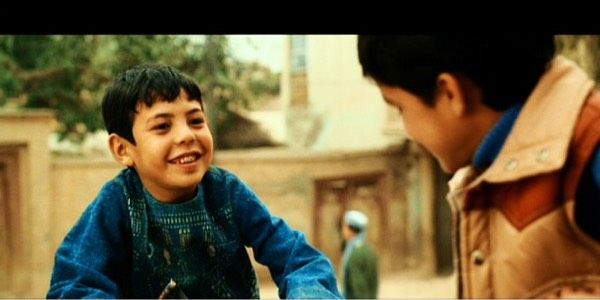本文为Sandy老师微信公众号旧文,旧词新讲,喜欢的朋友欢迎关注微信公众号查看更多内容。
Vocabulary
atone v. 弥补;赔罪;补偿;
It was my past of unatoned sins
afterthought n. [C] 事后的想法;追加的事物;
I thought about something Rahim Khan said just before he hung up, almost as an afterthought. ‘There is a way to be good again’.
tell on sb. 告发;检举;告…的状;
But he never told on me. Never told that the mirror, like shooting walnuts at the neighbor’s dog, was always my idea.
be deadly with 致命的,准确无误的,极富技巧性的
And he was deadly with his slingshot.
ache v. 持续并较强烈地疼痛;
I wondered if he longed to meet her. Did he ache for her, the way I ached for the mother I had never met?
rumour has it 据传闻
While Sanaubar’s brilliant green eyes and impish face had, rumor has it, tempted countless men into sin, Ali had a congenital paralysis of his lower facial muscles, a condition that rendered him unable to smile and left him perpetually grimfaced.
retaliate v. 报复;反击;
They may retaliate with sanctions on other products if the bans are disregarded.
Excerpt
动作描写
I remember the precise moment, crouching behind a crumbling mud wall, peeking into the alley near the frozen creek.
1、remember the precise moment替换 remember the moment precisely;
2、crouch behind 替换 hide;
3、peek v. 偷看,搭配介词into表示向着某地偷看。
4、near the frozen creek,以地点状语修饰同为地点的alley,状语作定语。
景色描写
The early-afternoon sun sparkled on the water where dozens of miniature boats sailed, propelled by a crisp breeze.
1、sun也可以加形容词修饰,这里用了early-afternoon,一方面描述了太阳的状态,另一方面指出了当前时间;
2、从sparkle on我们可以看出,这里的sun强调的是阳光。阳光在水上闪烁,实际上是水面波光粼粼。
3、miniature是微型的。这里说到微型的小船,我认为也可以理解为是从侧面描写小船距离远,湖面广。
4、虽然只用到了一句话,但这句话有静有动。刚讲完宁静的湖面和小船,就讲到crisp breeze,更显得舒适宜人。
Then I glanced up and saw a pair of kites, red with long blue tails, soaring in the sky. They danced high above the trees on the west end of the park, over the windmills, floating side by side like a pair of eyes looking down on San Francisco, the city I now call home.
1、风筝在天上飞,你会想到用dance这个单词吗?
2、a pair of kites,像天空的a pair of eyes,俯视着。
外貌描写
I can still see Hassan up on that tree, sunlight flickering through the leaves on his almost perfectly round face, a face like a Chinese doll chiseled from hardwood: his flat, broad nose and slanting, narrow eyes like bamboo leaves, eyes that looked, depending on the light, gold, green, even sapphire I can still see his tiny low-set ears and that pointed stub of a chin, a meaty appendage that looked like it was added as a mere afterthought. And the cleft lip, just left of midline, where the Chinese doll maker’s instrument may have slipped; or perhaps he had simply grown tired and careless.
词汇:sapphire 蓝宝石 appendage 附属物
作者这里说到Hassan的圆脸,像Chinese doll,让人生出好感。实际上Hassan也的确是让人感到安心的孩子,对此后文也有呼应。
Hassan唯一的不足就是兔唇,作者将这一缺点比喻为——也许是制作中国娃娃的工匠手中的工具不慎滑落,或者只是因为他倦了、心不在焉。
从某种角度上来说,这也是Amir对Hassan除兔唇外的外貌的褒奖。
动作描写
I'd sit by the door, knees drawn to my chest. Sometimes I sat there for an hour, sometimes two, listening to their laughter, their chatter.
我很喜欢作者提到的这个动作,knees drawn to my chest。这是一个孤独的、希望得到守护和爱的动作。小小的Amir坐在门前,听着屋内的欢笑和畅聊,不被父亲待见,该是多么孤单。
It had been a simple enough affair. No obstetricians, no anesthesiologists, no fancy monitoring devices. Just Sanaubar lying on a stained, naked mattress with Ali and a midwife helping her. She hadn't needed much help at all, because, even in birth, Hassan was true to his nature: He was incapable of hurting anyone. A few grunts, a couple of pushes, and out came Hassan. Out he came smiling.
这一段描述了Hassan出生时的场景,重看这段“He was incapable of hurting anyone”和“Out he came smiling.”,想着后文,aching for him。
Notes
第一章篇幅不长,简短却生动,以平实而又活泼的语言将读者带入到1975年的冬天的童年回忆。去年,老友Rahim Khan的一通电话让Amir想起了尘封已久的往事,二十多年前的那个冬天,是故事的开端却也冥冥之中指向结局,暗中预示着Amir的成长轨迹。
第二章开始讲述童年回忆,借助一个个故事的片段,描绘出了故事中的几个人物给读者的第一印象。印象比较深的有这样几个故事,一是Amir和Hassan玩耍,一边吃桑葚(mulberries)和核桃(walnuts),一边用镜子反射太阳光找到邻居家里或其他调皮捣蛋的事。Hassan的爸爸过来训斥孩子,Hassan从不说这是Amir的主意而默默忍受呵斥。二是Hassan出生时的场景,没有先进的医疗设施和药物,没有医护人员,只有一张破床垫和一个接生婆,却有Ali炙热而又期待的目光,而Hassan也正如他不会伤害任何人的性情一般,无比顺利的降临。
Character
I/Amir:富人的孩子,调皮捣蛋,却个性懦弱。母亲因生子去世,与父亲相依为命。
Hassan:忠厚老实,为人正直,出身贫穷,是Amir家仆人的孩子,地位很低。他的母亲在他幼年时抛弃了家庭。Hassan是Amir的好朋友,愿意为好朋友承担过错与责任。
Baba:Amir的父亲,非常富有。年轻时小有成就,常在书房和朋友抽烟闲聊,对Amir不是很重视也并不是很宠爱。
Rahim Khan:Amir父亲的好朋友和生意伙伴。他善解人意、通情达理,和Amir关系不错。
Ali:Hassan的父亲,年少时是孤儿,身体有残疾,而且脸有疾病,无法微笑或发怒,表情都只由眼睛表现出来。一贫如洗,由于出身贫寒且宗教地位低,经常被人看不起。
Sanaubar:Hassan的母亲,美丽漂亮,却不守妇道,比Ali小19岁,不是真心爱Ali和Hassan。Hassan出生后不久就独自离开了。

